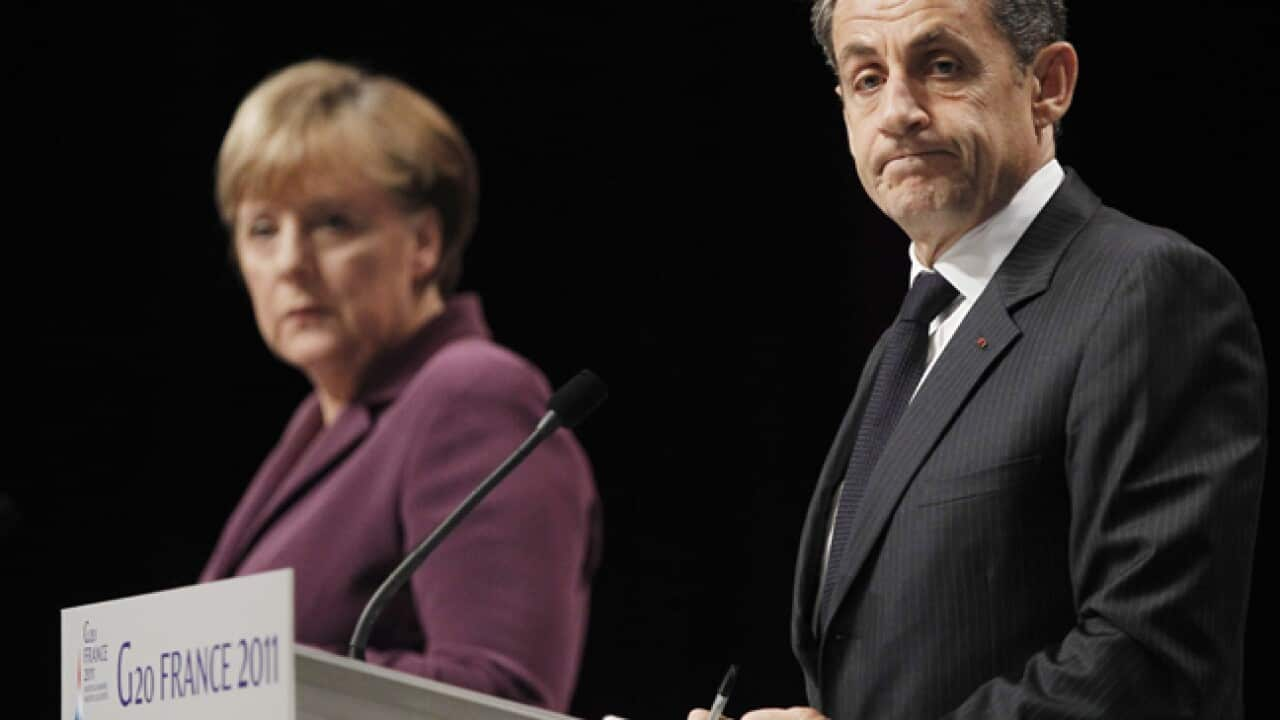The leaders of France and Germany have vowed to speed up various measures to ease the eurozone crisis, as crisis seemed to be again circling Athens with the IMF reportedly expressing doubts about Greece's ability to cut debts.
The euro, meanwhile, flirted with new lows on the market amid signs of heightened banking tensions.
French President Nicolas Sarkozy said after talks with Chancellor Angela Merkel on Monday that an agreement on stricter budgetary rules tying in all EU members except Britain should be signed by March 1.
Merkel said negotiations on a text were "progressing well" and announced Paris and Berlin could accelerate payments into a permanent fund for future possible bailouts that is due to come into force later this year.
"Germany and France are ready to review ... to what extent our payments can be accelerated in a certain way and thus once again make our trust in and support for the eurozone clearly visible," she told reporters.
EU leaders are looking into ways of arming the fund, the European Stability Mechanism, with its resources in one go, rather than putting in smaller tranches under the current plan.
The meeting between the two, at the forefront of efforts to combat the eurozone debt turmoil, came as the euro tested near 16-month lows against the dollar, amid new fears over the future of the bloc.
"The situation is tense, very tense," acknowledged Sarkozy.
"I don't think that in the history of Europe, leaders have had to deal with such a situation," added the president.
A recent slew of disappointing economic data, combined with renewed fears over the banking sector, have revived concerns that the eurozone is heading for a deep recession as the crisis shows little sign of easing.
Fuelling these fears, data earlier on Monday showed banks parked a record sum of cash at the European Central Bank, suggesting they are wary of lending to each other in the critical interbank market.
And for the first time, Germany sold five-year bonds with a negative yield, implying investors are rushing for the relative safety of debt issued by Europe's top economy that has thus far proved resilient to the crisis.
However, there were also emerging doubts over even this safe-haven status, as German industrial production dived by a worse-than-expected 0.6 per cent month-on-month in November.
EYES RETURN TO GREECE
Meanwhile the crisis also appeared to be returning with a vengeance to Athens, where it began, with the International Monetary Fund reportedly expressing growing doubts about Greece's long-term ability to reduce its debts.
A team of international auditors was due to return to Greece next week to assess the country's economy after Prime Minister Lucas Papademos warned of an "uncontrolled default" in March if no further aid was forthcoming.
Merkel called for the "rapid implementation" of reform measures in Greece, warning that new bailout funds could not be paid out otherwise.
Amid renewed speculation that Greece could be forced out of the euro, she nevertheless stressed: "It is our intention that no country should leave the eurozone."
Analysts were largely unimpressed by the meeting.
"The first Merkel/Sarkozy summit of 2012 produced little tangible results," said Christian Schulz from Berenberg Bank.
"The growth initiatives lack detail and negotiations on other elements are ongoing. At least on Greece they remain committed to help the country," added the analyst.
Traders appeared to shrug off the meeting, with little movement in European stock or bond markets.
The gathering in Berlin kicked off a flurry of diplomatic activity as European leaders seek to draw a line under the crisis.
Merkel and Finance Minister Wolfgang Schaeuble were to host IMF chief Christine Lagarde for closed-door "informal talks" in Berlin on Tuesday with the focus on Greece.
On January 20, Italian Prime Minister Mario Monti will host Merkel and Sarkozy in Rome, ahead of a meeting of eurozone finance ministers in Brussels three days later. An EU summit is due January 30.
Share

